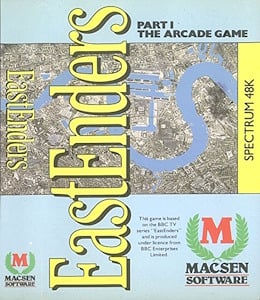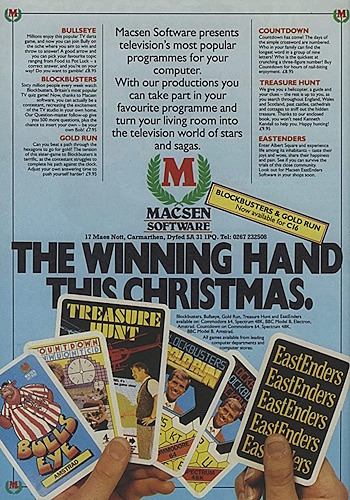EastEnders (1987-)
EastEnders was both developed and published by Macsen Software under licence from the BBC, arriving in the UK in 1987 for the ZX Spectrum 48K. Around the same time, a BBC Micro edition was also released, with an Amstrad CPC version trailed in magazine listings, though a Commodore 64 conversion never made it to market. The tie-in was part of Macsen’s short-lived push into television-based computer games during the mid-to-late 1980s, capitalising on popular BBC properties to attract a broader audience beyond the usual gaming crowd.
The game places you in the heart of Albert Square with a limited amount of in-game time to complete a variety of small but familiar tasks inspired by the TV soap’s setting. Players might help out at the laundrette, stock up produce for the market stall, tidy the allotments, or handle other everyday duties around Walford. The design clearly takes its cue from the domestic and community-focused narrative of the show, favouring brief, self-contained mini-games over extended arcade sequences.
While the graphics and animation were simple, the game opened with a short rendition of the EastEnders theme before dropping players into its task-based structure. Packaging and promotional materials leaned heavily on the BBC licence, with prominent use of the TV programme’s logo and style. Magazine adverts placed it alongside Macsen’s other BBC tie-ins, and coverage in computer press listings during 1986–87 gave the impression of a multi-platform release, even though not all planned versions saw the light of day.
Reception at launch was harsh. Crash magazine readers voted it “Worst Game” of 1987, and it has since been remembered in retrospectives as one of the weakest examples of a TV-to-computer adaptation. The game did not receive any sequels, with the EastEnders brand instead branching into other forms of merchandise, such as a 1988 board game. Macsen itself closed its doors not long after, leaving EastEnders as one of its most infamous and final releases.
Images from MobyGames
Buy EastEnders
Click one of the Ebay or Amazon buttons below to check the latest prices and purchase EastEnders for that particular platform.

Soap, SAtire and Spectrum Silliness?

If you’ve been lurking round your local WHSmith or Boots lately, you’ll have noticed the tape racks looking more like the BBC listings page. Since about ’85, there’s been a steady invasion of home computer games wearing the names of our telly favourites like a badge of honour. Doesn’t matter if you’re a Grange Hill kid, a Doctor Who nut, or glued to Coronation Street—some publisher’s probably had a bash at turning it into a 48K adventure.
Now, when these things are done properly, they can be cracking fun. Take Yes, Prime Minister—a witty, brainy text adventure that actually captured the dry, political wrangling of Hacker and Sir Humphrey. Even EastEnders tried to do more than just sling in Albert Square as a backdrop—it mixed location-hopping with light puzzle solving that, while hardly arcade-action stuff, at least made an effort to fit the show’s chatty, character-led vibe. In those rare cases, you could tell the coders actually watched the programme before slapping sprites together.
But blimey, there have been some absolute stinkers. Grange Hill, for one, felt like somebody had dusted off an old school-based adventure, changed a few names, and sent it off to duplication. And Dallas? If you could work out what was going on between the blocky faces and the sluggish controls, you deserved a medal. Far too often, these licensed jobs seem to have been thrown together over a couple of long weekends, banking on the idea that a big telly logo on the inlay would shift enough copies before word got round in the playground.
From the publishers’ angle, you can sort of see the logic. The Speccy, C64, and Amstrad shelves are crammed tighter than the bus to the computer club, so sticking a household name on your game was a shortcut to instant attention. Parents buying for Christmas saw a familiar programme title and thought, “Well, they watch it on telly—must be good!” That’s a lot easier than trying to sell something called Space Blaster IV from a no-name outfit in Barnsley.
The problem is, quick cash-grabs don’t often lead to classics. Tight deadlines, wafer-thin budgets, and the odd bit of recycled code meant loads of these games shipped with jerky scrolling, clunky collision detection, or gameplay thinner than the pages of a Sinclair User demo tape manual. For every thoughtful effort like Yes, Prime Minister, there were a half-dozen Auf Wiedersehen, Pet or ’Allo ’Allo! affairs that felt more like novelty souvenirs than actual games.
Still, I’ve got a soft spot for this flood of telly tie-ins. They’re a real snapshot of the UK games scene—scrappy, opportunistic, and quick to jump on a cultural bandwagon. Sometimes that meant a little gem you could show off to your mates, and sometimes it meant a cassette you quietly filed next to your copy of Horace Goes Skiing and never loaded again. Question is, will we see studios slow down and put some real polish into these adaptations… or is the market heading for a proper soap-opera-style cliffhanger ending?
Related Searches
EastEnders is available to purchase and download from a range of vendors. Always shop....
EastEnders may be available to download as abandonware from one of the many sites that offer this...
There are various sites out there that can offer cheat codes for games. Search now to find all available...
There are many sites out there that have collated and documented historic reviews of this game. Search now...
We don't host or link to rom sites for this game. However, there are many sites out there that may be...
The initial release date for EastEnders is stated as some time during 1987. Other ports of the game may....
EastEnders is available to purchase and download from the link(s) shown further up this....
There are multiple sites around the internet that offer visual guides to this game. Search now to find the....








